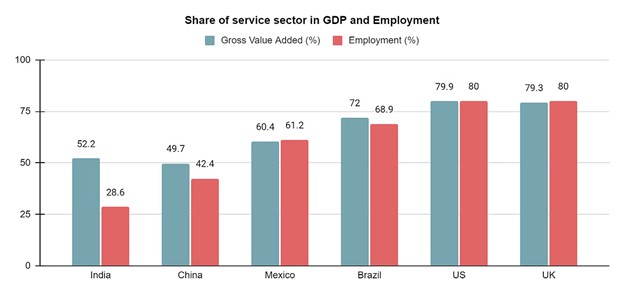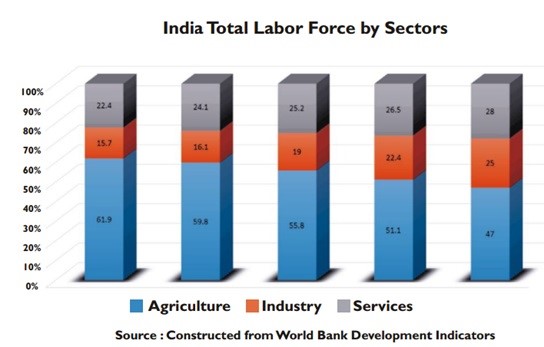Indian Economy
Transforming Education for the Service Sector
- 20 Feb 2024
- 16 min read
For Mains: Need for the development of adequate skill force for Services Sector.
In a rapidly evolving global economy, the services sector has emerged as a significant player, contributing 53% of India’s Gross Value Added (GVA) versus the 28% of the industry sector. This dominance of services is also evident in employment distribution - 31% of employment is generated in the services sector versus 25% in industries. This massive growth is fuelling the demand for entry-level employees across the spectrum of the services sector. This growth is not just limited to IT services; the organised Indian service sector, that comprises retail, telecom, consulting, hospitality, banking and health care, has been growing consistently. Further, for each of these sectors, India is also the offshore hub, delivering these services for the entire world through captive and Third Party Shared Services (TPSS) and Global Business Services (GBS).
Note
- Third-Party Shared Services (TPSS): This refers to the practice of outsourcing specific business functions or processes to external service providers. These providers are separate entities from the contracting organisation (hence, "third-party"), and they typically serve multiple clients.
- Shared services involve consolidating similar functions from different parts of an organisation or multiple organisations into a single, specialised unit. This approach aims to achieve economies of scale, improve efficiency, and reduce costs.
- Global Business Services (GBS): GBS is an evolution of the shared services model. It involves centralising and standardising business processes across an organisation's global operations. GBS goes beyond traditional shared services by integrating functions that were previously managed independently in different regions or divisions.
- GBS centres often leverage technology and automation to streamline operations, enhance decision-making, and drive innovation.
Why is there a Need to Upgrade the Service Sector Workforce?
- Needs Continuous Supply of Skilled Manpower:
- This massive service industry needs continuous supply of skilled manpower which is being fulfilled from a rather unusual education stream- engineering. According to Statistica, only 57% of engineering graduates are employable.
- An All India Council for Technical Education (AICTE) commissioned report highlighted that less than 60% of available engineering seats have enrolment. Another industry report claims that about 80% of graduate engineers end up in a non-technical job which is unrelated to their field of education.
- Engineers Being Employed in Non-Technical Sectors:
- A number of engineering graduates in India are steering towards the services sector not merely due to an ideal alignment of skills and job demand, but propelled by the dynamic and burgeoning nature of service-oriented opportunities and a lack of relevant jobs for their skills in their core sector.
- As a result, over the last decade, a large number of engineers are employed in non-technical sectors such as banking, insurance, hospitality, health care and retail across a variety of roles such as sales, customer service, back office operations, logistics and supply chain management.
- Need for Adaptable and Problem-Solving Mindset:
- Engineers are increasingly finding employment not solely based on a precise match of skills but due to the adaptability and problem-solving mindset ingrained in their education.
- Employers, who are faced with a dynamic market, are recognising the transferability of engineering skills, even if the roles themselves are not conventionally engineering-centric.
- The analytical prowess, problem-solving abilities, and structured thinking ingrained in engineering graduates make them highly sought-after in sectors that may not traditionally be perceived to be engineering-centric.

What is the Necessity for a Service-Sector-Specific Course in India?
- Need for Reflection on Evolving Nature of Market:
- This trend prompts a critical reflection on the evolving nature of job markets and the role of education in preparing graduates for a diverse array of professional challenges.
- As engineers seamlessly transition into roles such as sales, customer service and finance across a wide variety of sectors, it becomes imperative for the educational ecosystem to evolve and address this need from the service industry, and recalibrate their approach towards curriculum design and pedagogy.
- Lack of Generic Courses:
- Courses are only available in niche domains such as health care or hospitality. There is no generic course to cater to the needs of the services sector.
- As a result, services are consuming engineers, and to some extent management graduates/postgraduates, into entry-level jobs.
- Rather than focusing on bridging the gap between existing engineering education and job demand, there is a pressing need to develop generic services-oriented courses that can equip students to thrive in white-collar service environments.
- Just as an engineering education equips the student with the basic skills to find a vocation in an industrial setup, we need an equivalent services skill education that instils the necessary competencies to excel in the service-oriented landscape.
- Courses are only available in niche domains such as health care or hospitality. There is no generic course to cater to the needs of the services sector.
- Cultivating Soft-Skills:
- Such generic courses can offer a holistic blend of technical proficiency, soft skills, and industry-specific knowledge essential for success in service-centric roles.
- These courses should not only emphasise technical proficiency but also cultivate soft skills, business acumen, and industry-specific knowledge that are essential for success in the service sector.
- Integrating Diverse Technologies:
- By integrating cutting-edge technologies such as Artificial Intelligence (AI) and the Internet of things (IoT) into the curriculum, these programmes can enhance students’ employability, particularly in emerging sectors such as Fintech and edutech.
- Such a course would foster a cadre of professionals adept at navigating the complexities of modern service-oriented industries, with skills around process reengineering, problem solving and client management.
- By integrating cutting-edge technologies such as Artificial Intelligence (AI) and the Internet of things (IoT) into the curriculum, these programmes can enhance students’ employability, particularly in emerging sectors such as Fintech and edutech.
- Meeting Demands of Dynamic Service Landscape:
- Structured around a diverse curriculum, this course could encompass essential subjects and skills tailored to meet the demands of today’s dynamic service landscape. Professionals enrolled in this course would gain a solid foundation in service delivery fundamentals, covering core sector overview and nuances of service delivery in a physical as well as digital environment.
- Facilitating Adequate Training in Service Management:
- Additionally, they could receive training in service management principles, process improvement methodologies such as Lean Six Sigma, and critical thinking frameworks, empowering them to optimise service processes, drive operational efficiency, and tackle complex challenges with confidence.
- An emphasis on client management, communication skills and ethical conduct would foster a culture of professionalism and integrity among professionals, crucial to build strong client relationships and maintain trust in service-oriented roles.
Note:
- Lean Six Sigma is a methodology that combines the principles of Lean manufacturing and Six Sigma to improve performance by systematically removing waste and reducing variation in processes. It aims to enhance efficiency, productivity, and quality while reducing costs and enhancing customer satisfaction.
- The term "Six Sigma" refers to a statistical concept that measures how far a given process deviates from perfection. The goal of Six Sigma is to achieve processes that operate with no more than 3.4 defects per million opportunities (DPMO).
What are the Steps Required for Reforming Service-Sector Workforce?
- Introducing New Stream- ‘Service Engineering’:
- The introduction of such a course- “service engineering”- holds transformative potential, offering a pathway to enhanced employability, improved service delivery, and sustained economic growth.
- Graduates would emerge as highly sought-after professionals, equipped with the knowledge, skills, and mindset needed to excel in white-collar service environments across a variety of industries.
- Ensuring Affordability and Accessibility of Courses:
- Moreover, the affordability and accessibility of service engineering courses would make them an attractive option for students from tier 2 and 3 cities. The recent Periodic Labour Force Survey (PLFS)-7 reported the women’s participation in the workforce to be 37%.
- Since services typically offer better flexibility to employees, such a course can also help enable a supportive environment for women to balance work and family commitments while contributing to the workforce.
- Fostering Inclusivity and Innovation:
- Unlike conventional engineering programmes that require extensive hard infrastructure, service engineering courses would leverage digital platforms and virtual learning environments, significantly reducing costs and eliminating geographical barriers to education.
- This democratisation of education not only fosters inclusivity but also unleashes the potential of aspiring professionals from diverse backgrounds to contribute to India’s burgeoning services-driven economy.
- By investing in the development of a skilled workforce tailored to the needs of the services sector, India can position itself as a global leader in service innovation and delivery, driving prosperity and competitiveness in the services-driven economy of the future.
- Regulatory and Institutional Reforms:
- Regulations in a number of services sub-sectors are either outdated or non-existent. The government is trying to do away with outdated policies but there is a pressing need to implement new regulations in areas such as direct selling, e-commerce and cloud computing to facilitate the growth of these sub-sectors. Regulatory and institutional reforms will help modernise the services sector in India.
- Service Sector Tailored Policymaking:
- There is no government policy on how the sector can lead to inclusive growth. This is partly because the focus is on agriculture and manufacturing, and the service sector has largely been left to grow on its own.
- There is no nodal ministry for services like retailing while for others like transport and energy there are multiple ministries with conflicting interests.
- The quasi-federal governance structure has led to multiple regulatory bodies, numerous regulations, and multiple clearance requirements. For example, there are around 13 regulatory bodies for higher education, and each of them functions in isolation.
- There is an urgent need to focus on the service sector and to identify the key barriers faced by different types of services and then to undertake specific reforms.
- For instance, in road transport, reforms should focus on establishing a seamless supply chain by removing barriers to the interstate movements of goods. This can be done with the help of technology such as computerising check posts at state borders and with regulations such as implementing single goods and service taxes.
- There is no government policy on how the sector can lead to inclusive growth. This is partly because the focus is on agriculture and manufacturing, and the service sector has largely been left to grow on its own.
Conclusion
The services sector has become a cornerstone of India's economy, contributing significantly to Gross Value Added and employment. This growth has led to a demand for skilled professionals, with many engineering graduates finding opportunities in non-technical roles within the sector.
To address this trend, there is a need for generic services-oriented courses that equip students with the necessary technical and soft skills for white-collar service roles. Such courses can enhance employability, particularly in emerging sectors, and foster a culture of professionalism and integrity.
|
Drishti Mains Question: How can India enhance the employability of engineering graduates in the service sector, considering the mismatch between education and job demands? Discuss with solutions. |
UPSC Civil Services Examination, Previous Year Questions (PYQs)
Mains
Q.1 “Industrial growth rate has lagged behind in the overall growth of Gross-Domestic-Product(GDP) in the post-reform period” Give reasons. How far are the recent changes in Industrial Policy capable of increasing the industrial growth rate? (2017)
Q.2 Normally countries shift from agriculture to industry and then later to services, but India shifted directly from agriculture to services. What are the reasons for the huge growth of services vis-a-vis the industry in the country? Can India become a developed country without a strong industrial base? (2014)





